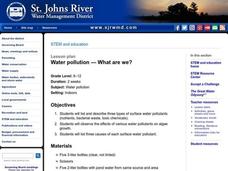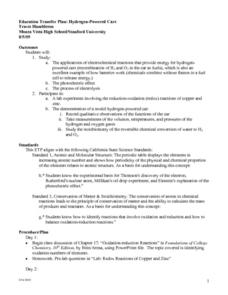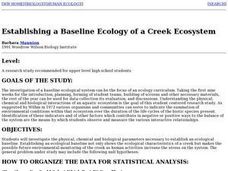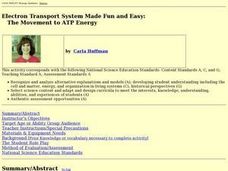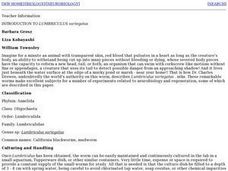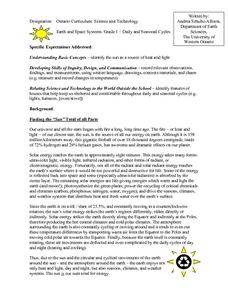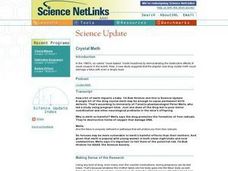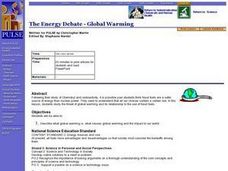Curated OER
What Are We?
Students list and describe three types of surface water pollutants. They observe the effects of various water pollutants on algae growth. Three causes of each surface water pollutant is listed.
Curated OER
Hydrogen Powered Cars
Students apply the principles of chemistry to investigate the concept of how a hydrogen powered car works. They study the electrochemical reactions that provide the energy source. Students also record observations in the functioning of a...
Curated OER
Down, Dung and Dirty
Students observe the changes seen in succession and the biodiversity of a community through its species richness and evenness. They create a dung culture in a clear plastic cup from horse, goat or cow dung then observe the numbers of...
Curated OER
Establishing a Baseline Ecology of a Creek Ecosystem
Students investigate the physical, chemical and biological parameters necessary to establish an ecological baseline. Establishing an ecological baseline not only shows the ecological characteristics of a creek but makes the possible...
Curated OER
Electron Transport System Made Fun and Easy:
Students identity the components of electron transport system through role play. They explain the role of intermediate energy carriers to the production of ATP molecules. They describe the relationship of electron transport system to...
Curated OER
Introduction to Lumbriculus variegatus
Students conduct two set experiments on Lumbriculus worms and create a third experiment of their own. The first of the two set experiments allows students to observe regeneration of the worms while the second allows students to test the...
Curated OER
Microbe Power - Using a Winogradsky Column as a Battery
In this lesson plan the student demonstrate analysis of the changes taking place in the bottle as well as bdemonstrate application of the interactions happening in the bottle by applying these changes to the environment.y measuring and...
Curated OER
From Eggs to Frogs
Third graders receive a small container of tapioca pudding, they are to pretend that it is frog eggs. The students pretend they are birds who see the eggs, and eat some of them. They discuss what would happen if these were really frog...
Curated OER
What's in the Water?
Fifth graders use the dots to simulate water pollutants in a lake. They use cups to collect a sample of "water." Students sort the dots by color and record the number of each dot color under the correct pollutant name in the Lake Water...
Curated OER
Daily and Seasonal Cycles
First graders identify the sun as a source of heat and light. They identify features of houses that help keep use sheltered and comfortable throughout daily and seasonal cycles. Students are told that summer is the best season to...
Curated OER
Rocks, Minerals, and Erosion
Fourth graders describe the difference between minerals (composed of the same substance throughout) and rocks (composed of two or more minerals). They recognize that there are three classes of rocks: igneous, sedimentary, and metamorphic
Curated OER
Air and Water in the Environment
Students demonstrate an awareness of air as a substance that surrounds us and takes up space, and whose movement we feel as wind. They predict and describe how local weather conditions affect living things, including themselves.
Curated OER
Coal Derivatives
Students use this hands-on activity to demonstrate the production of coke, one of the most widely used raw materials derived from coal. They are also stimulated to do research into the differences in coal types and coal products.
Curated OER
Crystal Meth
Students read and discuss an article on the devastating effects of crystal meth on a fetus development in mice. They relate this research to the possible causes of birth defects in babies whose mothers have used meth during pregnancy.
Curated OER
The Energy Debate - Global Warming
Learners describe what global warming is, what causes global warming and the impact to our world. They study the threat of global warming and its relationship to the use of fossil fuels.
Curated OER
States of Matter
Fourth graders define the term matter. They compare properties of solids, liquids, and gases. They describe how matter changes from one state to another. They classify objects as either solid, liquid, or gas.
Other popular searches
- Carbon Dioxide Oxygen Cycle
- Dissolved Oxygen
- Oxygen and the Human Body
- Oxygen Cycle
- Oxygen and Carbon Dioxide
- Carbon Oxygen Cycle
- Oxygen Carbon Dioxide
- Oxygen Cycle Diagram
- Solubility Oxygen
- Mount Everest Without Oxygen
- Plants and Oxygen
- Transporting Oxygen, Glucose


